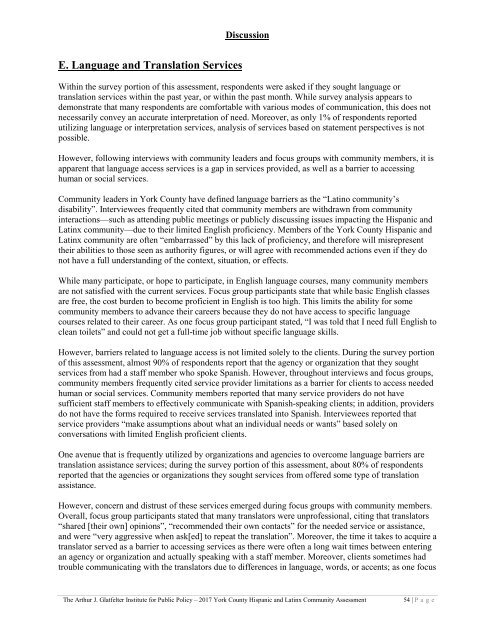2017 York County Hispanic and Latinx Community Assessment - Hess Print Proof
Create successful ePaper yourself
Turn your PDF publications into a flip-book with our unique Google optimized e-Paper software.
Discussion<br />
E. Language <strong>and</strong> Translation Services<br />
Within the survey portion of this assessment, respondents were asked if they sought language or<br />
translation services within the past year, or within the past month. While survey analysis appears to<br />
demonstrate that many respondents are comfortable with various modes of communication, this does not<br />
necessarily convey an accurate interpretation of need. Moreover, as only 1% of respondents reported<br />
utilizing language or interpretation services, analysis of services based on statement perspectives is not<br />
possible.<br />
However, following interviews with community leaders <strong>and</strong> focus groups with community members, it is<br />
apparent that language access services is a gap in services provided, as well as a barrier to accessing<br />
human or social services.<br />
<strong>Community</strong> leaders in <strong>York</strong> <strong>County</strong> have defined language barriers as the “Latino community’s<br />
disability”. Interviewees frequently cited that community members are withdrawn from community<br />
interactions—such as attending public meetings or publicly discussing issues impacting the <strong>Hispanic</strong> <strong>and</strong><br />
<strong>Latinx</strong> community—due to their limited English proficiency. Members of the <strong>York</strong> <strong>County</strong> <strong>Hispanic</strong> <strong>and</strong><br />
<strong>Latinx</strong> community are often “embarrassed” by this lack of proficiency, <strong>and</strong> therefore will misrepresent<br />
their abilities to those seen as authority figures, or will agree with recommended actions even if they do<br />
not have a full underst<strong>and</strong>ing of the context, situation, or effects.<br />
While many participate, or hope to participate, in English language courses, many community members<br />
are not satisfied with the current services. Focus group participants state that while basic English classes<br />
are free, the cost burden to become proficient in English is too high. This limits the ability for some<br />
community members to advance their careers because they do not have access to specific language<br />
courses related to their career. As one focus group participant stated, “I was told that I need full English to<br />
clean toilets” <strong>and</strong> could not get a full-time job without specific language skills.<br />
However, barriers related to language access is not limited solely to the clients. During the survey portion<br />
of this assessment, almost 90% of respondents report that the agency or organization that they sought<br />
services from had a staff member who spoke Spanish. However, throughout interviews <strong>and</strong> focus groups,<br />
community members frequently cited service provider limitations as a barrier for clients to access needed<br />
human or social services. <strong>Community</strong> members reported that many service providers do not have<br />
sufficient staff members to effectively communicate with Spanish-speaking clients; in addition, providers<br />
do not have the forms required to receive services translated into Spanish. Interviewees reported that<br />
service providers “make assumptions about what an individual needs or wants” based solely on<br />
conversations with limited English proficient clients.<br />
One avenue that is frequently utilized by organizations <strong>and</strong> agencies to overcome language barriers are<br />
translation assistance services; during the survey portion of this assessment, about 80% of respondents<br />
reported that the agencies or organizations they sought services from offered some type of translation<br />
assistance.<br />
However, concern <strong>and</strong> distrust of these services emerged during focus groups with community members.<br />
Overall, focus group participants stated that many translators were unprofessional, citing that translators<br />
“shared [their own] opinions”, “recommended their own contacts” for the needed service or assistance,<br />
<strong>and</strong> were “very aggressive when ask[ed] to repeat the translation”. Moreover, the time it takes to acquire a<br />
translator served as a barrier to accessing services as there were often a long wait times between entering<br />
an agency or organization <strong>and</strong> actually speaking with a staff member. Moreover, clients sometimes had<br />
trouble communicating with the translators due to differences in language, words, or accents; as one focus<br />
The Arthur J. Glatfelter Institute for Public Policy – <strong>2017</strong> <strong>York</strong> <strong>County</strong> <strong>Hispanic</strong> <strong>and</strong> <strong>Latinx</strong> <strong>Community</strong> <strong>Assessment</strong><br />
54 | P age


